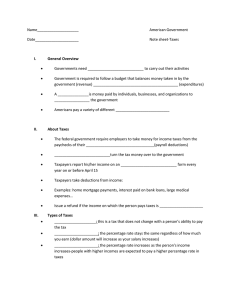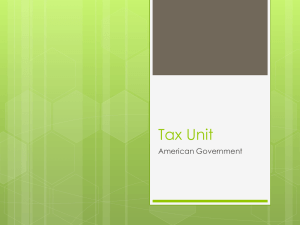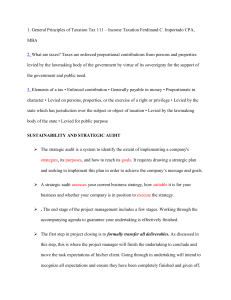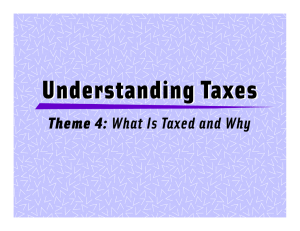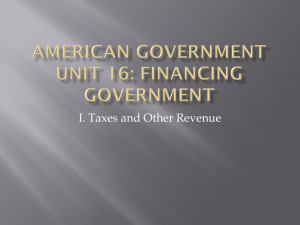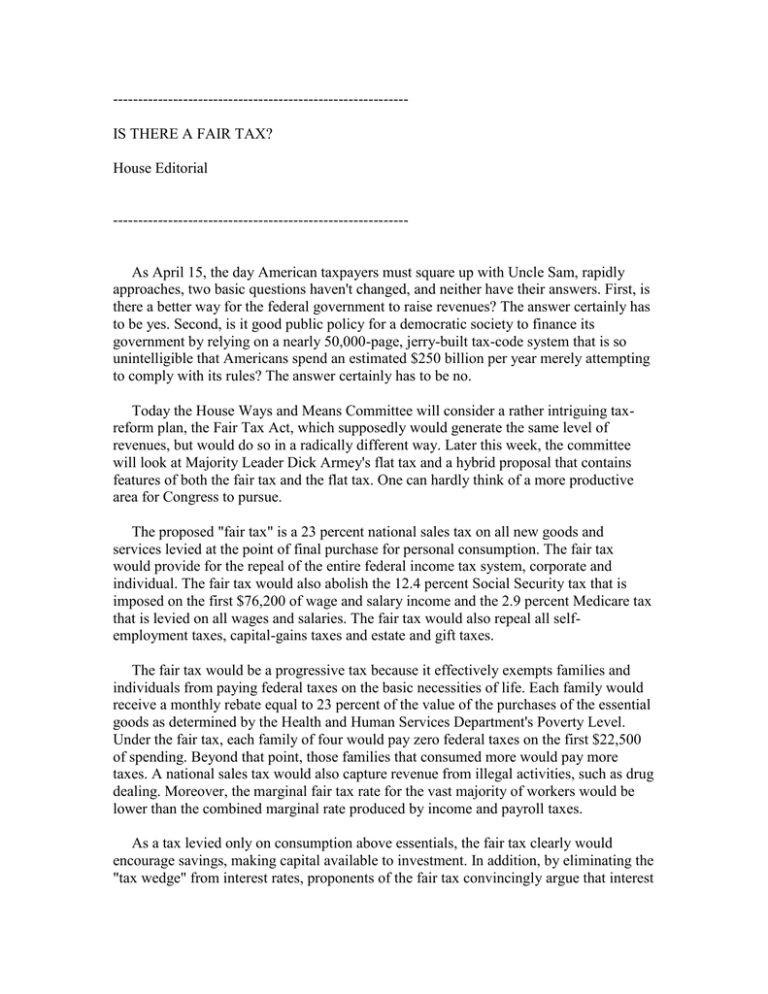
----------------------------------------------------------IS THERE A FAIR TAX?
House Editorial
-----------------------------------------------------------
As April 15, the day American taxpayers must square up with Uncle Sam, rapidly
approaches, two basic questions haven't changed, and neither have their answers. First, is
there a better way for the federal government to raise revenues? The answer certainly has
to be yes. Second, is it good public policy for a democratic society to finance its
government by relying on a nearly 50,000-page, jerry-built tax-code system that is so
unintelligible that Americans spend an estimated $250 billion per year merely attempting
to comply with its rules? The answer certainly has to be no.
Today the House Ways and Means Committee will consider a rather intriguing taxreform plan, the Fair Tax Act, which supposedly would generate the same level of
revenues, but would do so in a radically different way. Later this week, the committee
will look at Majority Leader Dick Armey's flat tax and a hybrid proposal that contains
features of both the fair tax and the flat tax. One can hardly think of a more productive
area for Congress to pursue.
The proposed "fair tax" is a 23 percent national sales tax on all new goods and
services levied at the point of final purchase for personal consumption. The fair tax
would provide for the repeal of the entire federal income tax system, corporate and
individual. The fair tax would also abolish the 12.4 percent Social Security tax that is
imposed on the first $76,200 of wage and salary income and the 2.9 percent Medicare tax
that is levied on all wages and salaries. The fair tax would also repeal all selfemployment taxes, capital-gains taxes and estate and gift taxes.
The fair tax would be a progressive tax because it effectively exempts families and
individuals from paying federal taxes on the basic necessities of life. Each family would
receive a monthly rebate equal to 23 percent of the value of the purchases of the essential
goods as determined by the Health and Human Services Department's Poverty Level.
Under the fair tax, each family of four would pay zero federal taxes on the first $22,500
of spending. Beyond that point, those families that consumed more would pay more
taxes. A national sales tax would also capture revenue from illegal activities, such as drug
dealing. Moreover, the marginal fair tax rate for the vast majority of workers would be
lower than the combined marginal rate produced by income and payroll taxes.
As a tax levied only on consumption above essentials, the fair tax clearly would
encourage savings, making capital available to investment. In addition, by eliminating the
"tax wedge" from interest rates, proponents of the fair tax convincingly argue that interest
rates would be nearly one-third lower than they otherwise would be, thus further adding
to the nation's capital stock.
Meanwhile, with a zero rate of taxation for corporate profits, the United States would
attract much more foreign investment from all over the globe. The removal of payroll and
income taxes from the cost of goods produced in America would increase foreign
demand for the nation's relatively cheaper exports. Compliance costs for a national sales
tax would be a small fraction of the current system's $250 billion in compliance costs,
offering the tantalizing prospect of virtually eliminating the IRS and improving efficiency
at the same time. The fair tax, so its proponents argue, would markedly increase
economic growth in both the short and long runs.
Whether all of these wonderful projections from a national sales tax would really
come to pass is a matter that deserves debate. House Ways and Means Committee
Chairman Bill Archer deserves credit for doing more than bemoaning the current state of
affairs. He is doing a service by shedding light on alternative tax regimes. Whether or not
the fair tax will ever see the light of day, the debate cannot begin soon enough.
----------------------------------------------------------This article was mailed from The Washington Times
(http://www.washtimes.com).
For more great articles, visit us at
http://www.washtimes.com
Copyright (c) 2000 News World Communications, Inc. All rights reserved.
Contact Americans for Fair Taxation: http://www.fairtax.org
-------------------------------------------------------------

